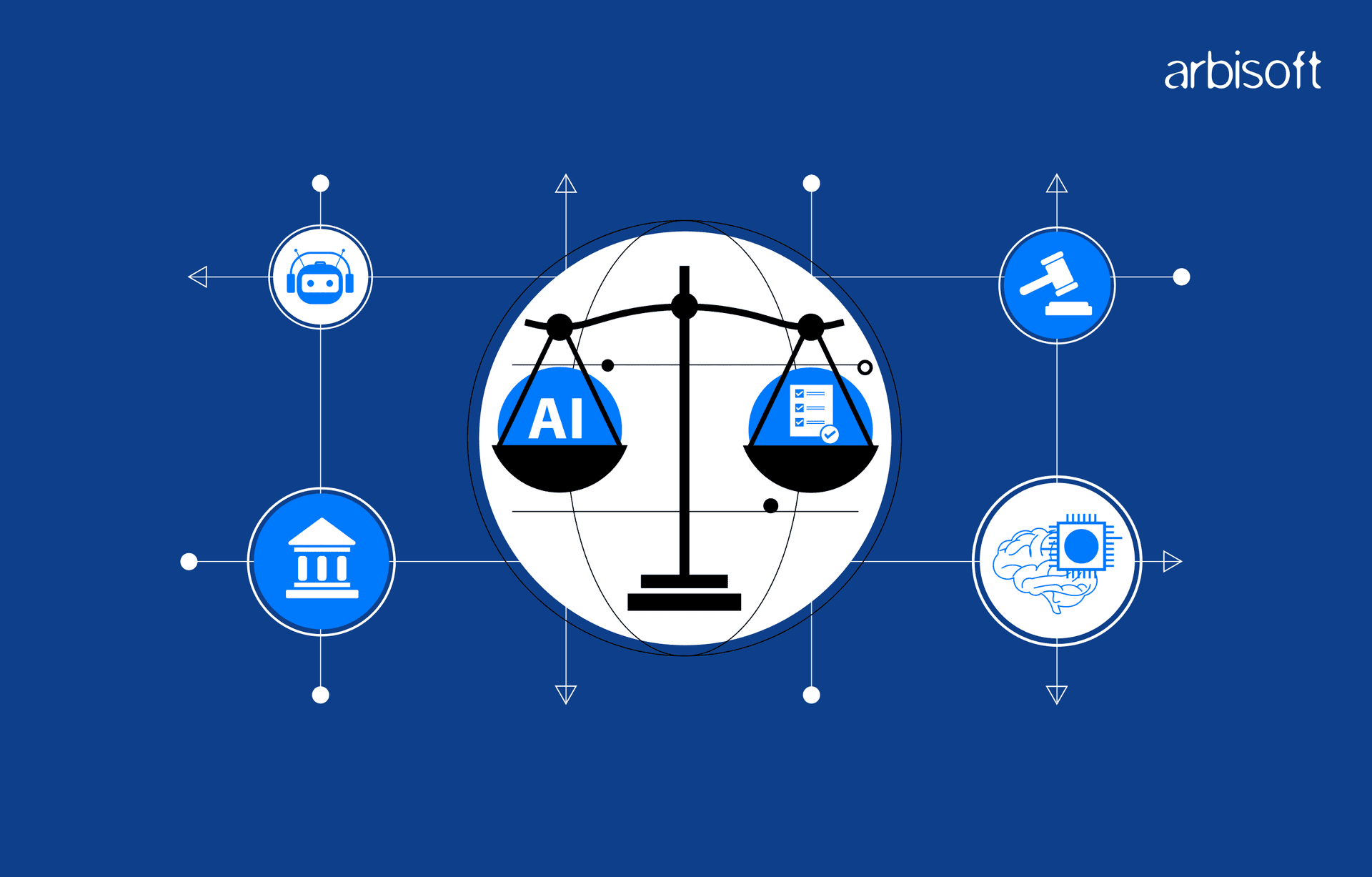We put excellence, value and quality above all - and it shows




A Technology Partnership That Goes Beyond Code

“Arbisoft has been my most trusted technology partner for now over 15 years. Arbisoft has very unique methods of recruiting and training, and the results demonstrate that. They have great teams, great positive attitudes and great communication.”
Exploring the Difference and Significance of AI Ethics & Governance

Artificial Intelligence is no longer a futuristic concept - it's a powerful force reshaping everything around us constantly. From diagnosing diseases to automating financial transactions, AI is revolutionizing industries and enhancing our daily lives. However, as AI systems become increasingly sophisticated and autonomous, the ethical implications and governance challenges associated with their development and deployment have become increasingly pressing.
The global AI market is projected to reach a staggering $1.5 trillion by 2030, according to a report by PwC. This rapid growth is driven by advancements in technologies like machine learning, natural language processing, and computer vision.
But with this growth comes significant ethical concerns. For instance, algorithms used in hiring decisions have been found to perpetuate gender and racial biases. Autonomous vehicles face challenges related to safety, liability, and decision-making in complex scenarios. The misuse of AI for malicious purposes, such as deepfakes and cyberattacks, underscores the necessity for robust cybersecurity services to protect against such threats.
In this blog, we will explore AI ethics and governance and their interrelationship, as well as the challenges and opportunities they present.
Understanding AI Ethics
AI ethics is a multidisciplinary field that focuses on the moral and societal implications of AI development and deployment. It seeks to ensure that AI systems are designed and used in a way that aligns with human values and avoids harmful outcomes.
Key components of AI ethics include:
- Fairness - AI systems should be designed to avoid discrimination and bias. For example, a study by ProPublica found that an algorithm used by a US county to predict the likelihood of criminal recidivism was biased against African-American defendants.
- Accountability - There should be mechanisms in place to hold AI systems accountable for their actions. This includes transparency about decision-making processes and the ability to challenge and correct errors. For instance, the European Union's General Data Protection Regulation (GDPR) provides individuals with a right to explanation, allowing them to understand the logic behind automated decisions that affect their rights.
- Transparency - AI systems should be understandable and explainable, allowing for scrutiny and accountability. This can be achieved through techniques like interpretability, which involves making AI models more understandable to humans. For example, researchers at Google have developed techniques to explain the decisions made by neural networks, making it easier to identify and address biases.
- Privacy - AI systems should respect individual privacy and data protection rights. This requires careful consideration of data collection, storage, and use practices. The Cambridge Analytica scandal, in which the personal data of millions of Facebook users was obtained and used for political targeting, highlights the importance of data privacy in the age of AI.
Understanding AI Governance
AI governance refers to the frameworks, policies, and regulations that guide the development, deployment, and use of AI systems. It aims to ensure that AI is used responsibly and in a way that benefits society.
A few key components of AI governance include:
- Policy development - Creating clear and comprehensive policies that address AI-related issues, such as data privacy, algorithmic bias, and autonomous weapons. For example, the European Union has adopted a comprehensive AI strategy that outlines its approach to AI governance, including principles for trustworthy AI and a regulatory framework.
- Regulation - Implementing laws and regulations to govern AI development and use. This can include specific regulations for AI applications in certain sectors, such as healthcare or finance. For instance, the General Data Protection Regulation (GDPR) in the European Union provides a robust framework for data privacy and protection, which has significant implications for AI development and use.
- Standards - Establishing technical standards and guidelines for AI systems. This can help to ensure interoperability, quality, and safety. For example, the IEEE has developed ethical standards for AI, providing guidance for developers and users on issues such as fairness, accountability, and transparency.
- Oversight - Monitoring and auditing AI systems to ensure compliance with ethical and legal requirements. This may involve independent audits, risk assessments, and impact evaluations. For instance, the UK's Centre for Data Ethics has been established to provide guidance and oversight on AI-related issues.
Avoid ethical pitfalls with this checklist to boost your AI's credibility and ensure responsible AI development.

Is your AI project on the right side of ethics? Our checklist guides you through the ethical minefield, ensuring your project aligns with the highest standards.

The Interrelationship Between AI Ethics and Governance
AI ethics and governance are closely intertwined. Strong ethical principles provide a foundation for effective governance, while sound governance structures can help to ensure that AI systems are developed and used ethically.
a. AI Ethics Informs Governance
Ethical principles guide the development of policies and regulations, ensuring that AI is used for beneficial purposes and avoids harmful outcomes. For example, the principle of fairness can inform regulations related to algorithmic bias, while the principle of transparency can guide the development of guidelines for explainable AI.
b. Governance, in turn, Supports AI Ethics
Effective governance structures can help to enforce ethical principles and hold developers and users accountable for their actions. For instance, regulations can establish penalties for violations of ethical principles, while oversight mechanisms can monitor compliance with ethical standards.
Simply put, AI ethics and governance are two sides of the same coin. Strong ethical principles are essential for responsible AI development and deployment, while effective governance structures are necessary to ensure that these principles are upheld.
To illustrate the complexities of AI ethics and governance, let's look at a few real-world case studies.
- COMPAS - A recidivism risk assessment tool used by many US jurisdictions has been criticized for racial bias. Studies have shown that the algorithm disproportionately predicts a higher risk of recidivism for African-American defendants.
- IBM Watson Health - The AI-powered medical decision support system developed by IBM was found to be inaccurate in its recommendations for cancer treatment. This highlighted the importance of rigorous testing and validation of AI systems in healthcare.
- Wells Fargo scandal - The bank's use of AI-powered sales systems contributed to a widespread scandal involving the creation of millions of unauthorized customer accounts. This case raised concerns about the ethical implications of using AI to incentivize sales behavior.
- Amazon Rekognition - Amazon's facial recognition technology has been used by law enforcement agencies in the United States and elsewhere. However, the technology has been criticized for its potential to misidentify individuals, particularly people of color.
Future Directions
As AI continues to advance at a rapid pace, with advanced techniques such as deep learning solutions driving innovation, the challenges and opportunities associated with AI ethics and governance will only become more complex. To ensure that AI is developed and used responsibly, it is essential to adopt a proactive and forward-looking approach.
International Measures
The global nature of AI development and deployment necessitates international cooperation to address the challenges and opportunities associated with AI ethics and governance. Several initiatives are underway to promote international collaboration and the development of global standards and frameworks.
- OECD AI Principles - The Organization for Economic Co-operation and Development (OECD) has developed a set of AI principles that guide governments and organizations on how to develop and use AI responsibly.
- G20 AI Principles - The G20 group of nations has also adopted a set of AI principles, which focus on promoting innovation, inclusivity, and trust in AI.
- Global Partnership on AI - This international initiative aims to promote responsible and beneficial AI development and use. It brings together governments, businesses, and civil society organizations from around the world.
Education and Awareness
Education programs can help to equip individuals with the knowledge and skills needed to engage in meaningful discussions about AI and its implications.
- Educational initiatives - Many organizations, including universities, research institutions, and non-governmental organizations, are developing educational programs on AI ethics and governance. These programs can help to raise awareness among students, policymakers, and the general public.
- Public engagement - Engaging the public in discussions about AI ethics and governance is crucial for ensuring that AI is developed and used in a way that aligns with societal values. This can be achieved through public forums, town halls, and online discussions.
Continuous Evaluation and Adaptation
The rapid pace of technological advancement means that AI ethics and governance frameworks must be continuously evaluated and adapted to keep up with emerging challenges and opportunities. This requires ongoing research, monitoring, and evaluation.
- Research can help to identify emerging trends and challenges in AI ethics and governance. For example, research on algorithmic bias can inform the development of policies to address this issue. Organizations are increasingly turning to ai and data science services to leverage data-driven insights for ethical AI implementations.
- Monitoring AI systems can help to identify potential risks and ensure compliance with ethical and legal requirements. This can be done through audits, assessments, and impact evaluations.
- AI ethics and governance frameworks may need to be updated or revised to address new challenges or opportunities. This requires a willingness to adapt and evolve as the AI landscape changes.
A Path Forward
As AI continues to transform our world, it is imperative that we navigate the ethical and governance challenges associated with its development and deployment. By understanding the key principles of AI ethics, implementing effective governance structures, and fostering international cooperation, we can ensure that AI is used responsibly and for the benefit of society.
To an AI landscape that is fair, equitable, and beneficial for all!
























